Author: Alyssa (Aly) Brewer
Location: Outapi, Namibia
Pronouns: She/Her/Hers
I distinctly remember before I left to study abroad in Southern Africa, my friend and I got lunch together for an informal “see you later.” We talked about our lives, school work, and how excited I was to travel to Namibia. I showed him a picture of Windhoek, the city I would be living in. To his surprise, the photo displayed towering buildings, paved roads, and modern cars. I am not telling this story to criticize his views, but to shed light on this mainstream idea of “Africa.” Africa is a continent full of rich intertwining cultures. Every country, every area, every city, is unique from the next. There is no blanket definition. Like in the United States, each family has their own identity, ethnicity, and language. And all of this became quite apparent to me when I spent a week living with a family in rural Northern Namibia.
Before we left to Outapi, the instructors taught us basic greetings and how to ask for food, water, and the toilet in Oshiwambo, the local language. All of us were jittery with nerves. We stocked up on toilet paper, portable chargers, and exchanged ideas of how to properly bathe from a bucket.
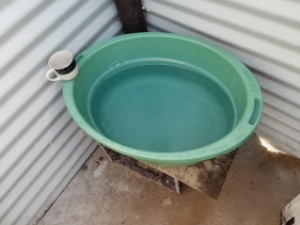
Surprisingly, the bucket shower became one of my favorite parts of the morning!
To be honest, I was holding in my anxiousness the whole 10 hour ride up there. As soon as we arrived and families started singing for us, my worries melted away. The families were as full of smiles as we were of exhaustion. But despite our heavy bodies, our spirits were up. We gathered around, greeted each other, and learned who we would be staying with for the week. My family welcomed me with open arms. I immediately felt loved by Meme Thusnelde and Tate Fillemon. (*Meme is the Oshiwambo equivalent of “M’am” as is Tate with “Sir”). Their daughter Margareth also welcomed and introduced me to her two year old son, Wofa (I never got the spelling but this is how it sounded). After the initial greeting, we were off! I climbed in the back of their pick-up truck and sighed my first breath of relief since we left Windhoek that morning.
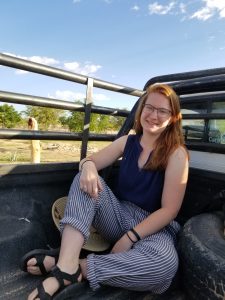
While the instructors warned us countless times how hot it is in Northern Namibia, the heat still surprised us. It’s the kind of heat when you sweat, it evaporates before you can feel it. Hats are a necessity and sunscreen becomes your new best friend. Sleeping became a great challenge because my family’s tin house absorbed all the heat throughout the day. At night, I felt like I was sleeping in a microwave. Another surprising challenge was the food. While it was delicious and well-prepared, my body had a difficult time adjusting to it. But these minor inconveniences were drops in the ocean of this entire experience. My host sister and I laughed and danced with each other every evening. Her son and I chased each other around the farmstead. The stars every night speckled the sky is a brilliant hue. The fat chickens slept on tiny tree branches (which still makes me laugh just thinking about it). My host dad and I ran after a goat one night and planted a tree the next. My host mom hugged me warmly in the way only a mother can. While my body might have rejected the environment, my heart belonged in it.
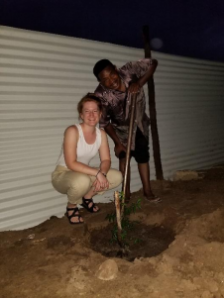
There were dozens of fruit trees across the property. I was honored to help plant another!
I learned so much in my six days living with them. Greeting culture is the utmost importance. It took me until the end of the stay to fully get the sequence right.
- “Walalapo Meme” (Good morning M’am)
- “Walalapo” (Good morning response)
- “Nawa?” (How are you?)
- “Nawa, ehh?” (Good, and you?)
- “Ehh” (Yes, good)
Even then, I do not know if that is completely correct. And the greeting changes depending on who you are speaking to and what time of day it is. It was difficult at first to get out of my American way of thinking. Here, you spend a whole five minutes greeting someone before you can carry on with your day. Back in the States I usually go for the classic Midwestern half-smile or “hey.” Here, you must face the person and acknowledge their presence- it is a form of respect. After practicing the greeting so often, it almost became second nature amongst us students. We even greeted each other that way at times.
This journey has changed how I view life in multiple ways. For one, time is fluid here. There is never a rush. At first, my American “go go go” attitude became frustrated with the lackadaisical atmosphere. Now, I embrace it. In the States, we value time as money. Even when greeting someone we are short and to the point. Here, time is what you make it. My host family never rushed me to wake up, they never had a set schedule. We awoke when we got fed up with the rooster crowing. We made food when we got hungry. We talked when we wanted to and sat in silence when there was nothing to say. There was no pressure, just peace.
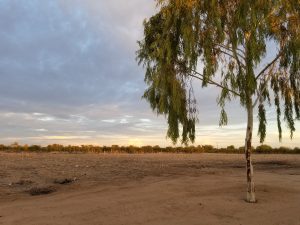
Important side note! The picture above is my host family’s field. Normally it would be towering with mahango plants at this time. Namibia is facing an extreme drought due to no rain in the rainy season causing crops and livestock to die at alarming rates. In a nation where 70% of the population relies on farming to sustain themselves, no rain is a crisis. We might not see climate change’s effects in the US, but here it is undeniable.
Reflecting on the experience so far, I am blessed to have met so many people from different cultural backgrounds in Southern Africa. Each of them has their own story to tell. Some are graduate students studying to be doctors. Some are musicians living off donations from passersby. Some, like my host family, are farmers in rural Namibia struggling to overcome the most devastating drought in their lifetime. Every person I meet paints a more colorful picture of what Africa truly is. It is not a single nationality, race, or language. It is a beautiful blend of people who each have a story to share- a story that needs to be heard.
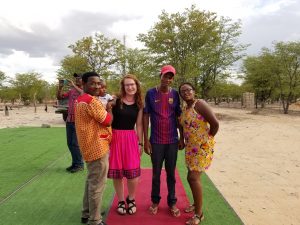
My family and I took a photo together at the goodbye party. They provided me with a traditional Oshiwambo skirt and Ostrich egg shell necklace to wear. I will miss them dearly! (Right to left) Tate Fillemon, Wofa the baby, myself, the cab driver for the family, Margareth. *Meme Thusnelde was not able to attend the goodbye party due to work.
Leave a Reply